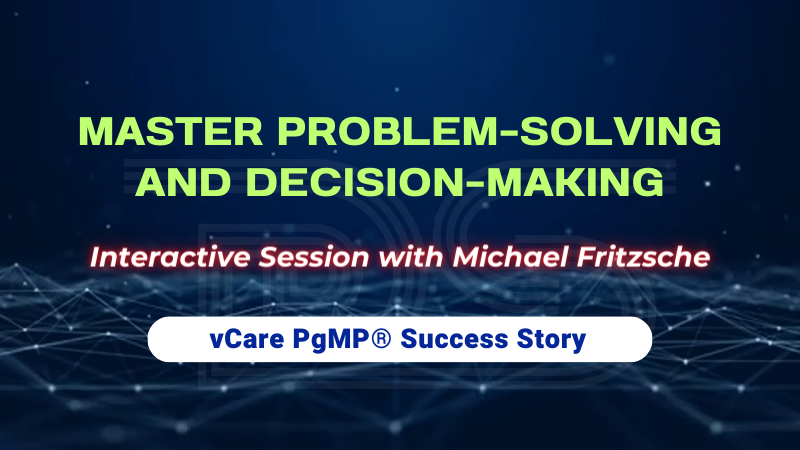
by Dharam CW2 | Mar 9, 2024 | Professional Development Webinars
Join me for an exclusive webinar where Michael Fritzsche, a distinguished Project, Program, and Portfolio Management professional in the automation industry from Rheinböllen, Rhineland-Palatinate, Germany, will share his journey and experiences, offering attendees a unique perspective on overcoming challenges and leading strategic projects.
Key topics to be covered include:
– Equipping Senior Managers for Strategic Decision-Making.
– The Dynamics of Human Judgment vs. Algorithms in Decision-Making.
– Best Practices for Building Stakeholder Trust and Credibility.
– Effective Use of Deadlines to Boost Productivity.
🔗 Reserve your spot now: https://bit.ly/3ON2Ibl
Session Date: 21st March 2024
Session Time: 09:30 AM – 10:30 AM (PDT) / 10:30 AM – 11:30 AM (MDT) / 11:30 – 12:30 PM (CDT) / 12:30 PM – 01:30 PM (EDT) / 01:30 PM – 02:30 PM (BRT) / 04:30 PM – 05:30 PM (GMT) / 05:30 PM – 06:30 PM (CET) / 07:30 PM – 08:30 PM (AST) / 08:30 PM – 09:30 PM (GST) / 10:00 PM – 11:30 PM (IST)
🚀 Elevate Your Project Management Career:
– Book an obligation-free consultation session on Project management Career, training, and certifications: http://talktodharam.com
– Discover training offers and certification discounts: https://bit.ly/3jWVepD
– Stay updated with our Q&A series and certification success stories by subscribing to the vCare Project Management YouTube channel at https://bit.ly/2YF0wJl
– Follow my podcasts and interviews with Project Management Experts on YouTube at https://bit.ly/2NDY8wd
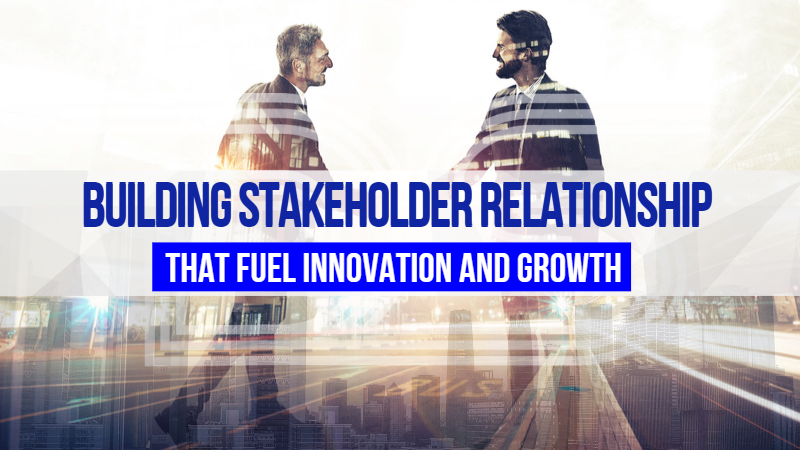
by Dharam CW2 | Aug 25, 2023 | General
The modern workplace is undergoing a significant transformation. As a result, project professionals in both the public and private sectors worldwide have started to recognize the full range of benefits that successful project management can bring to their businesses and are prepared to make the required adjustments, particularly on cultural changes.
The success of each project is dependent on an effective project management strategy. Considering the next generation of project professionals, it is critical to have an efficient leader who can direct this process since it is methodically planning, organizing, and executing a pre-determined series of procedures to maximize resource utilization and achieve objectives. Project goals will likely be met with a manager monitoring adequate planning and checking off milestones.
To compete in the upcoming competitive market, a project manager must have the technical, digital, and other essential project management skills to comprehend future project challenges. On the other hand, a project leader with an effective skill set can tackle all the challenges in a project in the right way. So here are some of the challenges and skill sets to manage a project for the next generation of project managers.
Challenges of Project Management
According to data provided in the PMI’s Pulse of the Profession 2020, 11.4 percent of corporate investment is lost owing to poor project performance.
What variables might contribute to poor project performance? There are examples of a need for more precise planning, inconsistent procedures and techniques, incorrectly managing or accounting for all project stakeholders, budget overruns, and other causes.

Categories of Project Failure
However, if we take a step further, the causes of project failure fall into three major categories:
- People
- Processes
- Communication
Let’s look at the most common challenges for project managers and some tips on how to overcome them.

Challenges of Project Management
- Undefined Goals
Identifying project goals is one of the most common challenges in project management. The entire project and team might suffer when objectives need to be clearly defined. When top management cannot agree on or support undefined goals, the project has a limited likelihood of success. To define and convey clear goals, the project manager must ask the right questions and make the right decisions.
- Scope Creep
“Scope creep” occurs when incorrect project management permits the scope of a project to expand beyond its initial objectives. Clients and supervisors may request modifications to a project, requiring the project manager to examine each request and determine how and whether to accept it meanwhile also conveying the implications to all stakeholders regarding budget and timelines.
- Inadequate Skills for the Project
A project may necessitate the use of talents that the project’s contributors may need to have. Project management may assist a project manager in determining the required competencies, assessing existing personnel, and recommending training, outsourcing, or recruiting extra people.
- Lack of Accountability
When each team member accepts responsibility for their role in project success, the project manager’s leadership characteristics may come through. A lack of responsibility, on the other hand, might bring a project to an end. Learning to lead groups toward a shared objective is an essential part of project management.
- Improper Risk Management
Another key aspect of project management is learning to cope with and plan for risk. Because projects rarely go as planned, risk management is a desired project manager trait. To do their work effectively, project managers must solicit input, build trust, and understand which aspects of a project are most likely to deviate from the original plan.
- Ambiguous Contingency Plans
Project managers must understand which path to pursue in pre-defined “what-if” situations. The entire project may become entangled in unexpected problems if contingencies are not recognized. On the other hand, requesting that people identify possible problem areas can result in a smooth and successful project.
- Poor Communication
Poor communication can cause major project management issues. Project managers must offer direction at all project stages so that each team member understands what is expected from them. Therefore, effective communication with all people involved in the project is critical to its success.
- Resource Deprivation
Management must offer adequate resources for a project to function smoothly and successfully. The project management process aids project managers in establishing demands and securing approval up front, as well as how to assign and prioritize resources during a project.
- Lack of Stakeholder Engagement
A project can be ruined by an uninterested team member, customer, CEO, or vendor. A skilled project manager communicates openly and invites input at every stage to increase participant participation.
- Digital Transformation
Adapting to the correct tools, systems, and procedures becomes even more crucial as more firms board the digital transformation train. This difficulty stems from adapting to the appropriate project management system, enabling teams to construct, change, and improve existing procedures to expand and scale.
Overall, project management is in great demand and isn’t going away anytime soon. Indeed, project management is anticipated to expand by 33% by 2027. However, to keep up with the ever-changing business landscape, project managers must be updated on proper project management methods and trends.
Major Challenges for the Next Generation Project Managers

Major Challenges for the Next Generation Project Managers
- The first major challenge project managers must confront is technology globalization and the disruption of traditional corporate culture and model. This aspect includes eliminating the requirement to do business or manage projects from a single place. The adaptation of the “virtual team” has become a must, and a company’s agility might mean the difference between success and failure. What used to take months may now be accomplished instantly, emphasizing the necessity of a company’s ability to fast and naturally adapt to the fluctuating nature of today’s technology culture.
- The second major concern is worker involvement, a project manager’s capacity to grasp various roles and responsibilities and use agility to wear numerous “hats” depending on the project. Knowing generational drives, establishing moral leadership, and understanding how the team performs are all part of this.
- Finally, project managers will be impacted by innovation and risk. The problem is figuring out how to strike a balance between innovation and risk—as managing risk is an important project management skill—but without it, it’s hard to realize the entire project’s potential.
Future Trends of Project Management
Consider project management ten years ago: fewer tools, smaller teams, and more straightforward tasks. Since then, the project landscape has changed dramatically, with important developments such as:
- Blockchain
- Artificial intelligence
- Sustainability
- Remote teams

Future Trends of Project Management
Trend 1 – Blockchain
More businesses use blockchain technologies for management, such as when conducting dispute investigations. The capacity of blockchain to automatically update data makes it ideal for reconciling records and transactions. One of the most significant contributions of blockchain to project management will be smart contracts, which are effectively self-executing contracts powered by computer code.
Smart contracts reduce the number of key functions within the project manager’s scope, such as checking on project milestones and assigning new ones, which speeds up management processes. As a result, quicker workflow assures project completion on time and improves a company’s overall performance.
Trend 2 – Artificial Intelligence
Artificial intelligence is increasingly finding its way into project management systems, managing anything from predictive analysis to risk management. Because of its efficacy, as per the PwC report, by 2030, AI is expected to contribute:
- $42.7 B (7.7%) to Egypt’s economy
- $135.2 B (12.4%) to Saudi Arabia’s economy
- $96.3 B (13.6%) to the UAE economy
The primary capacity of AI is to provide data insights for decision-making, which increases the agility of any given project.
Trend 3 – Sustainability
Project sustainability is more critical than ever now. Governments and societies worldwide are demanding greener alternatives throughout the life cycle of a project.
Green initiatives are cost-cutting solutions for businesses. For example, energy is required for project completion, and shifting to renewable sources reduces costs. In addition, this frees up resources that may be directed toward other essential areas like innovation and research. Meanwhile, sustainable practices improve a company’s reputation and encourage consumer loyalty.
Trend 4 – Remote Teams
Remote teams have been the norm since the advent of communication technology. As a result, businesses gain from a more diverse and borderless talent pool easily available through contracts. In addition, they spend less on office space, travel, and other administrative expenses.
Data from Upwork’s Future Workforce Report 2021 revealed that more than half of the US population was working remotely to some level. Furthermore, 40.7 million Americans will likely be fully remote during the next five years.
Furthermore, in its 2022 State of Remote Work Report, Buffer discovered that 97% would promote remote work to others and continue to work remotely, at least for some time or for the rest of their lives. On the other hand, just 26% of businesses are prepared to offer a remote work environment.
As a result, it’s not unexpected that more workers anticipate that workplaces will become entirely virtual over the next several years. In general, remote working arrangements enable businesses to extend their resources while increasing operational efficiency. As such, they are crucial in developing lean, competitive firms.
Key Skills needed for Next-Generation Project Managers
Because of rising trends such as remote teams, digitalization, and automation, project management has changed dramatically in recent years. More companies rely significantly on technology to plan, execute, and monitor work.
As an example:
- Big data and artificial intelligence for better risk forecasting
- Remote progress tracking using digitization technologies
- Automation software for more efficient execution
These solutions have improved firms’ management capabilities and altered project management’s future.
According to Gartner research, 80% of management duties will be automated by 2030, and future managers will need more technical skills. They must be knowledgeable about cybersecurity, blockchains, machine learning, and robots, all of which are expected to play larger roles in management.
To stay up with trends in modern project management, a fundamental understanding of topics such as data science, conflict resolution, and entrepreneurship is required. For example, data science skills may assist a manager in incorporating AI into more elements of the project life cycle. Here’s a closer look at what these skills include and how they’ll stay up with future innovations in project management.

Key Skills Needed For Next Generation Project Managers
Skill 1 – Data Science
Big data insights are essential management tools in the future, especially for large projects with extensive life cycles. In terms of planning, insights from previous projects indicate inefficiencies that can guide the current project, such as the number of idle hours and their causes. In terms of execution, data analytics assess progress and spot deviations early, such as changes in material prices and exchange rates that exceed estimates.
Skill 2 – Conflict Resolution
Today’s projects are extremely complicated, with constantly changing deliverables. As a result, conflicts are never far away.
These conflicts, if left unaddressed, can undermine your team’s performance, resulting in delays and missed deliverables. Managers must thus understand the aspects of conflict resolution, such as:
- Behavioral and organizational aspects of a positive workplace
- Effective communication
- Effective contingency planning
Skill 3 – Entrepreneurship
Project managers are essentially CEOs. On the one hand, they are in charge of project deliverables, while on the other, they are negotiating with shareholders and setting targets based on estimates. As a result, being productive requires more than technical and administrative skills. Project managers must also have entrepreneurship skills, such as strategic thinking and market insight. This skill is beneficial for modifying deliverables, which is typical in agile projects like software development.
Skill 4 – Resource Management
Budgets and timeframes became tighter as projects got more significant and more complicated. Today’s project managers must balance budget constraints, deliver quality, and achieve deadlines with limited resources. They are entrusted with creating a lean organization.
For optimal efficacy, a delicate balance of resource allocation is required, as over-allocation to one activity inhibits the others. So, managers must understand resource management principles such as equilibrium shifts and flexibility.
Skill 5 – Digital Skill
Digital skills are essential for future project managers. According to the CBI’s report on developing a world-leading innovation economy, upskilling employees with digital skills is critical. However, the digital skills pipeline could be improved. They believe more should be done to foster more ambition in that field.

Digital Skills For Project Managers
Project managers need to have the following digital skills:
- Data analysis, analytics, and management
- Data security and protection
- Compliance with the rules and regulations
- Leadership and collaboration online
- Management of knowledge
- Decision-making based on data.
Considering the vital significance of the project manager’s role and how it changes, here is a list of additional skills for project leaders to follow in the present and future to enhance their careers and succeed.

Skills For Future Project Leaders
- Emotional Intelligence: The capacity to detect and interpret events and interactions (both verbal and nonverbal) in the context of the project plan.
- Adaptive Communication:The ability to explain one’s views to various individuals, groups, and cultures, whether orally or in writing, utilizing the most successful communication approaches for each group.
- People Skills: The ability to rapidly establish and maintain strong connections with team members and stakeholders.
- Management skills: The capacity to serve, encourage and concentrate a team, and create team member collaboration.
- Flexibility:The willingness and capacity to modify one’s project management style and course of action in response to business needs.
- Business Skills:Understanding the organization’s business, strategy, and industry. Understanding of a plan and ability to coordinate tactical work around that strategy.
- Analytical abilities:The capacity to think through circumstances and make judgments.
- Customer Focus:The ability to comprehend the end user’s or end customer’s demands and the drive to guarantee that projects meet those needs.
- Results-Orientation:The capacity to do tasks efficiently and successfully.
- Character:The project manager should have a pleasant demeanor and a solid moral and ethical foundation.
Final Thoughts
With a focus on the future generation, we’ve entered a project management world where we need to be aware of the key challenges we’ll encounter as project managers and the skills we’ll need to improve to succeed: technology globalization, worker engagement, and the battle between innovation and risk. There are, however, a few crucial insights to remember as you continue your journey through the strange and ever-changing world of project management.
- Be agile or be gone:Business constantly needs greater flexibility, strategy, and adaptability than ever before. No one strategy will work every time; knowing how to adjust to change with agility and rapidity is essential.
- Expect all teams to act differently:Teams will always be more diverse than those who make them up. However, you can lead more successfully if you genuinely grasp your team and each member’s unique imperatives. Because project teams determine project success, one of the most crucial skills of a competent project manager is the ability to construct an effective, high-performing team.
- Help team members understand the big picture:This will assist them in preparing for obstacles. When attempting to resolve an issue or manage change, keep the immediate consequences in mind to prevent losing sight of the forest for the trees.
Feel free to check out my discussion on this topic with Thomas Walenta in YouTube

by Dharam CW2 | Jun 4, 2023 | General
Project management may be challenging. Addressing changing business demands, allocating limited resources, and managing team workloads can all result in dealing with complicated project management aspects on a day-to-day basis. However, having high-level assistance and guidance can be a lifesaver. Steering committees accomplish precisely that. Project management steering committees give administrative assistance and troubleshoot issues to keep projects on schedule to achieve their objectives.

Steering Committee
Steering Committee
A steering committee is an advisory body of important stakeholders overseeing and supporting a project to ensure its success. Project steering committees are also known as stakeholder boards, senior leadership teams, and project working groups. They manage projects from beginning to end, offering direction and assistance throughout the project’s lifecycle.
A steering committee’s primary concern is the organization’s direction, scope, budget, timeline, and techniques. Steering committees will meet regularly to discuss these issues to identify where they are and where they want to go to stay on track.

Project Steering Committee
Project Steering Committee
A steering committee may also be a group working together on initiatives. In this case, steering committees assist project managers in ensuring that projects are aligned with business objectives. They identify and manage risks, maintain project quality, and track progress and timeframes. In addition, the committee can approve changes to the project scope, budget, and strategy.
A project steering committee is a part of a larger organization for project governance. Companies that plan major projects that need collaboration across departments and include multiple stakeholders gain from a steering committee that can direct project management. The committee supervises the team’s progress toward fulfilling benchmarks and goals in this role.
The committee is in charge of project management, financial analysis, and recognizing changes that influence the project’s original scope. Furthermore, the project steering committee ensures that all points of view are heard and that any problems between stakeholders or departments are resolved.
Role of a Steering Committee
A steering committee can accomplish its core goal by utilizing a range of group and individual functions. When a steering committee gives advice and guarantees that items are delivered on time and in good condition, a company may reap significant benefits from its project successes. Some of the most important group-based steering committee positions that influence a business’s and consumers’ satisfaction with a product include:
- Providing input on the growth or development of a business or initiative.
- Addressing concerns and offering guidance on budgeting, marketing, recruiting, and other financial issues.
- Identifying the outcomes or objectives that the project must achieve.
- Prioritize the steps and objectives that must be completed to meet the project’s objectives.
- Assisting in the formulation of business-related policies, processes, and guidelines.
- Identifying, monitoring, and eliminating potential operational risks.
- Setting project deadlines or timelines and keeping track of progress.
- Monitoring the final work’s quality.
- Making plans for how a client or consumer will react to a product or service.
- Analyzing and discussing changes that have occurred or will occur to guarantee the project’s success.
- In the workplace, encouraging team members to collaborate.
- Where relevant, providing further insights on business or project concerns.
Members of the steering committee generally do not work on the project directly; nevertheless, committee members may perform various tasks individually to help assure the project’s success. Therefore, individual steering committee members should understand and strive to improve the strategies used to achieve project goals, be genuinely interested in the project and its outcome, promote the project whenever possible, and maintain a broad understanding of project management concerns, in addition to attending team meetings.
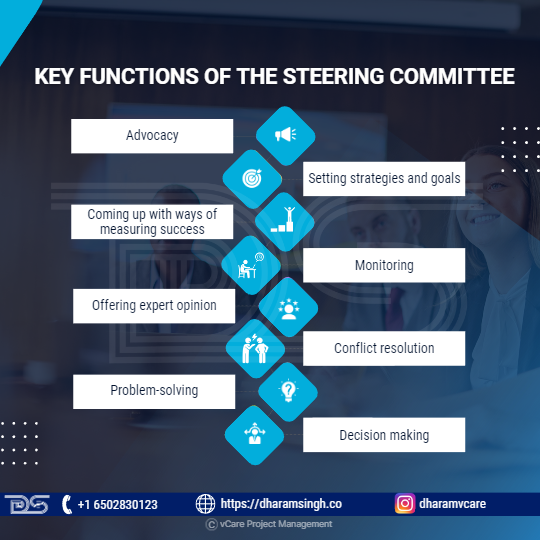
Key Functions of The Steering Committee
A steering committee is an advisory committee made up of various stakeholders and firm officials. They assist in making choices on various initiatives, with members directly interacting with project managers. Here are some of the key functions of the Steering Committee:
- Advocacy
A steering committee advocates for the organization’s varied goals and programs. Remember that it is generally composed of top management and specialists.
- Setting strategies and goals.
Steering committees develop strategic directions for initiatives. They also provide advice and opinions on budgeting, assets, money, time, facilities, marketing, and hiring. Goals and project scope are established as part of their employment.
- Coming up with ways of measuring success
There are several metrics for measuring performance. The steering committee is in charge of establishing how a product’s success is measured.
- Monitoring
The steering committee serves as an advisory body as well as a monitoring body. It ensures that projects fulfill the necessary quality standards and monitors any changes. It also keeps track of project processes and plans, which is critical to project success. The committee also analyzes and monitors project or company hazards before devising solutions to mitigate them.
- Offering expert opinion
The steering committee comprises experts who provide expert opinions on various issues concerning projects or the entire business. Their involvement is generally required, especially while working on a complex project.
- Conflict resolution
Disagreements are normal, mainly while working on a specific project. However, to ensure that issues do not disrupt the overall project, these committees resolve disputes between stakeholders, giving them more time to focus on what is best.
- Problem-solving
One of the functions of any advisory body is to discover solutions to problems the organization may be experiencing. It can generate various problem-solving ideas due to the experts on the strategy committee.
- Decision making
Although the steering committee’s primary function is to provide counsel, it also participates in decision-making. For example, it can analyze, accept, or reject project plans or recommend revisions to the supplied plans based on the members’ feedback.
The committee also engages in role allocation because its members can appoint project managers and other professionals to complete assigned tasks.
Ways to prepare for the project steering committee meeting
Important information and documents must be communicated with all steering committee members before the planned meeting, including:
- Meeting agenda
- Minutes of the previous steering committee meeting
- Project progress report from the project manager
Certain team members should be in charge of creating steering committee meeting documents and scheduling meetings. The steering committee is led by a chairperson who runs the meeting according to the agenda. They also ensure that all committee members express their viewpoints and ideas.
A basic meeting agenda would include the following:
- Recognizing and distributing the previous steering committee meeting minutes with other committee members.
- Conduct a thorough review of action items decided at previous sessions.
- Analyze the project status report filed by the project manager.
- Have a thorough discussion about any additional issues of concern or project requests.
- Select a date, time, and location for the next steering committee meeting.

Steering committee Best Practices For Project Success
Steering committee best practices for project success
Consider the following steering committee best practices for project success, whether you hold your meeting online or in person:
- Allow adequate time for the project team and committee members to prepare.
- Focus on the most important project KPIs and milestones and deliver them to the committee members in a format that everyone can agree on, such as a presentation, report, or infographic.
- Present project facts that are factual, contextual, and relevant. Share any inconsistencies or difficulties as soon as possible before they become significant issues.
- Schedule meetings in advance and automate meeting alerts to go out a week and a day ahead.
- Ensure comprehensive documentation of all meeting discussions and distribute it to committee members before the next meeting.
- Maintain the project charter and refer to it whenever there is doubt about authority, accountability, or strategic direction.

Challenges for Steering Committees
Challenges for Steering Committees
Because project management steering committees are comprised of employees from various backgrounds and functions, they will almost always experience certain challenges. These are some examples:
- Conflicting interests:As the committee includes cross-functional representatives, they will frequently have opposing ideas and interests. People think differently, which may be shown in their behavior, activities, and perspectives.
- Slow decision-making:Team decision-making is typically slower than individual decision-making.
- Lack of clarity in roles:Many committee members may need to know their individual or team responsibilities. A clearly defined charter for the steering committee ensures transparency and clarity about their duties in the project.
Final Thoughts
Every organization needs a Project Steering Committee to lead its transformation initiatives, beginning with a contemporary approach to project management. It may be instantly productive by initiating the process of managing project priorities. Steering committees are extremely crucial in efficient project management. They add value by keeping projects on pace, reducing risks, and resolving problems. When creating one, it is essential to evaluate the overall composition.
The steering committee plays a crucial role in project management that should be considered. The steering committee is the project’s administrator. This functionality does not exonerate the project of responsibility. On the contrary, this role necessitates that the steering committee participates in the project and not simply monitors the project group’s performance from the sidelines. This move will strain the steering committee’s multiple tasks and the time spent on the project.
Feel free to check out my discussion on this topic with Justin Buckwalter in YouTube
For any questions related to your Project Management career, training, and certifications, you can book an obligation free 15 minutes session with me by visiting talktodharam.com
You can subscribe to the vCare Project Management YouTube Channel to catch future videos of our Q&A series and certification success stories: https://bit.ly/2YF0wJl
You can subscribe to and follow my podcasts and interviews with Project Management Experts on YouTube at https://bit.ly/2NDY8wd
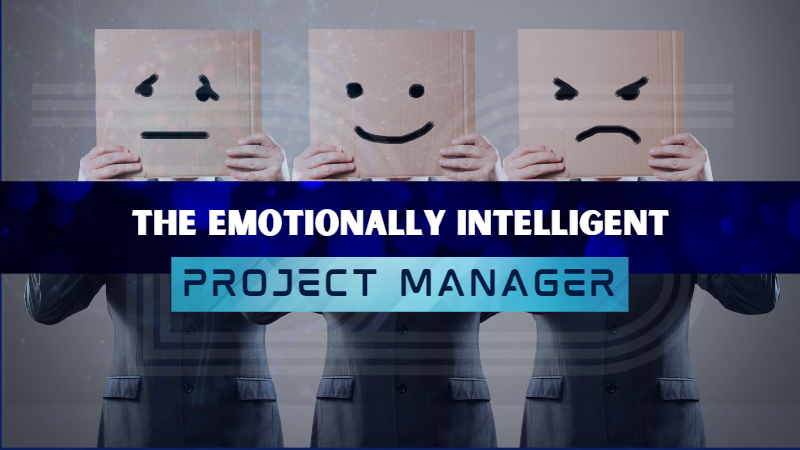
by Dharam CW2 | May 19, 2023 | General
Emotional intelligence in the workplace is becoming increasingly important for leaders and project managers as remote work became more prevalent due to the pandemic. Success in project management and managing cross-functional remote teams is only possible with emotional intelligence.
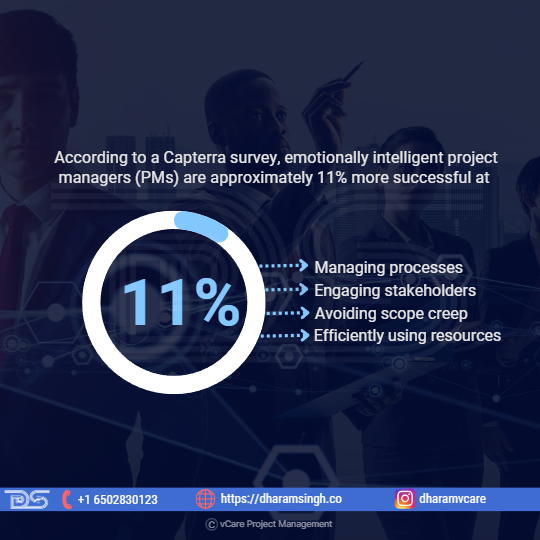
Capterra Survey
According to a Capterra survey, emotionally intelligent project managers (PMs) are approximately 11% more successful at managing processes, engaging stakeholders, avoiding scope creep, and efficiently using resources than PMs who lack this skill.
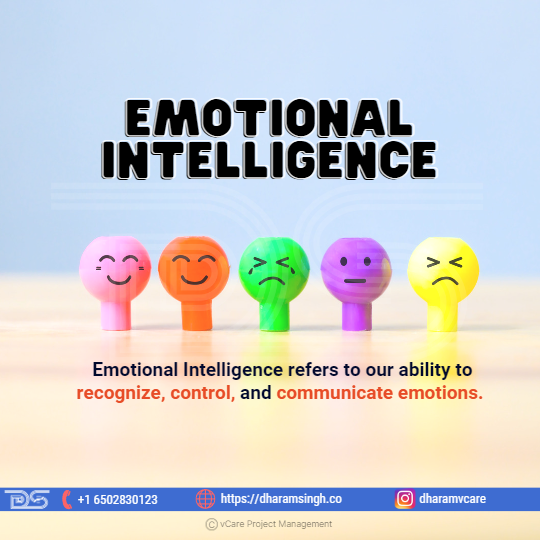
Emotional Intelligence
What is Emotional Intelligence?
Emotional intelligence refers to our ability to recognize, control, and communicate emotions. People with high emotional intelligence understand how they feel, what their feelings imply, and how their feelings affect others. In interpersonal situations, it is also the ability to empathize with others. Emotional intelligence is about creating a positive work environment, which is critical to the success of any project.
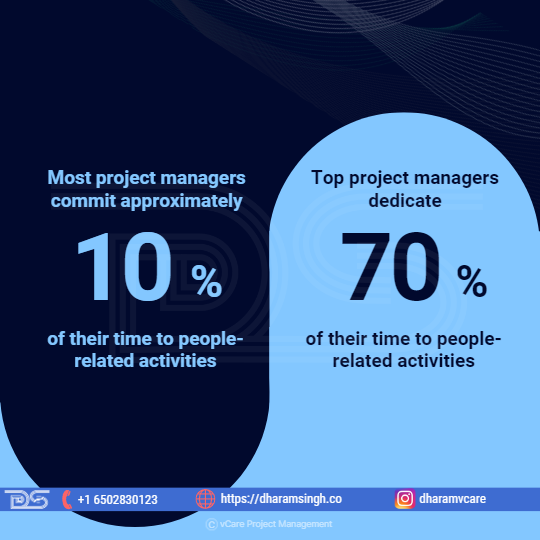
As Per LiquidPlanner Study
According to a LiquidPlanner study, most project managers commit approximately 10% of their time to people-related activities. Top project managers dedicate 70% of their time to these activities. As a result, we can conclude that emotional intelligence is crucial for project success.
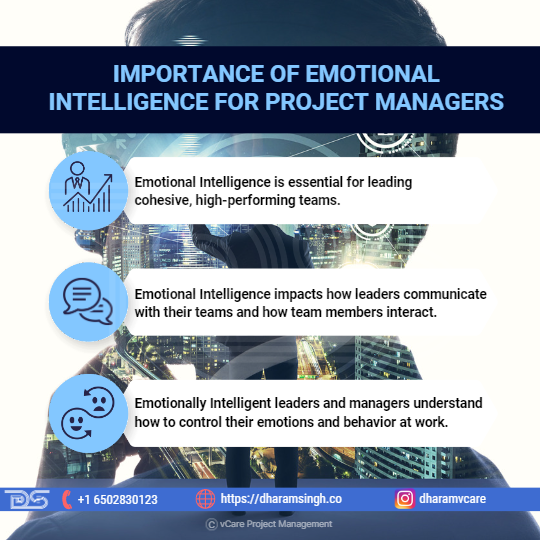
Importance of Emotional Intelligence for Project Managers
Importance of Emotional Intelligence for Project Managers
- Emotional intelligence is essential for leading cohesive, high-performing teams.
- According to researchers and behavioral scientists, Emotional intelligence impacts how leaders communicate with their teams and how team members interact.
- Emotionally intelligent leaders and managers understand how to control their emotions and behavior at work, which includes providing safe environments for exchanging ideas and feedback, productive teamwork and performance, good morale, employee engagement, and job satisfaction. They manage workplace stress and conflict with care and educate their team members to do the same.
Characteristics of Emotional Intelligence
What can project managers do to help themselves develop and become more aware? First, let’s examine five abilities for raising emotional intelligence:
- Self-Awareness – The ability to sense, identify, and comprehend emotions is self-awareness. Unfortunately, many of us were taught to ignore our emotions in the past. However, it is critical to be aware of your feelings to make appropriate decisions and act accordingly. Those with high self-awareness are self-assured, authentic, open to feedback, and capable of maintaining perspective throughout all project phases.
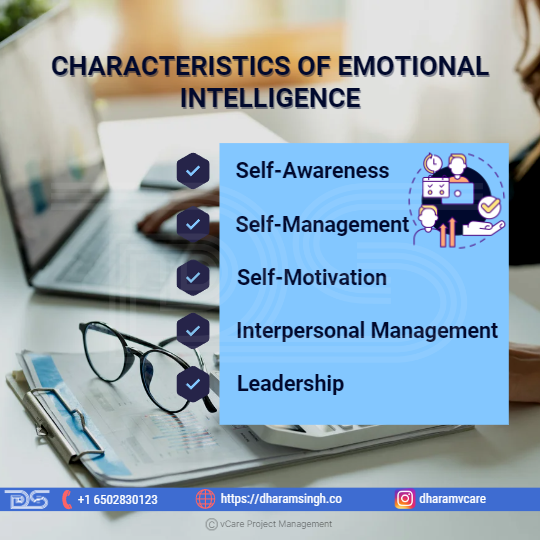
Characteristics of Emotional Intelligence
- Self-Management – Self-management is the ability to reason well while understanding feelings. Many frequently react based on their frame of reference rather than selecting a response based on their current unique circumstances. Self-managers are deliberate in decision-making, taking the initiative, framing events appropriately, maintaining perspective, and responding quickly. They understand their feelings and why they have them and effectively manage their responses.
- Self-Motivation – Self-motivation is the ability to channel the power of your emotions toward a specific goal. When project teams have a purpose, these ‘P’s follow peace, passion, power, perspective, and potential leverage. Self-motivators who are influential are optimistic and have a positive attitude. They can delay gratification and assert themselves.
- Interpersonal Management – The capability to identify and respond properly to the emotions of others is referred to as interpersonal management. If you can connect with people and acknowledge their humanity, they will answer openly, leading to common trust.
- Leadership – An emotionally intelligent project manager inspires guides, challenges, and supports the team. Leadership is defined as the ability to create and communicate vision and passion for assisting individuals and organizations in reaching their full potential.
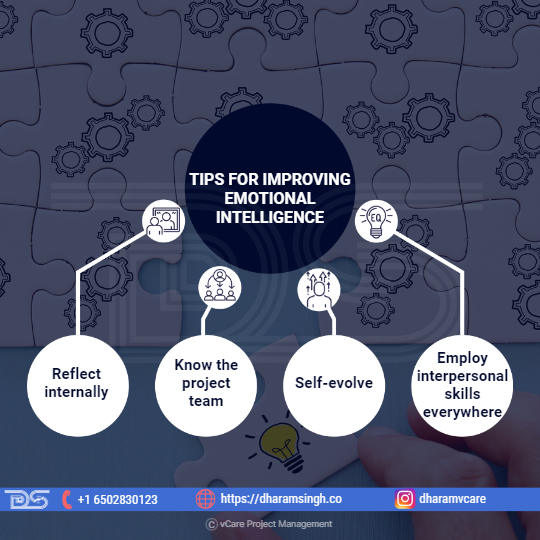
Tips for improving Emotional Intelligence
Tips for improving Emotional Intelligence
- Reflect internally – To become more emotionally aware, one must first understand their emotions and then regulate them in stressful situations. Next, they have to figure out what motivates them. Finally, authenticity is necessary to develop emotional intelligence by leading a successful project team and establishing meaningful relationships with stakeholders.
- Know the project team – Project managers are usually aware of the people they must contact when working on a project. However, understanding the project team, from team dynamics to personalities to dealing with conflict and stress, is just as important. To improve emotional intelligence, one must first get to know their team, communicate with them, and understand their emotions. It will also help the success of their project. This job becomes even more important for teams that operate in multiple locations and are diverse.
- Self-evolve – Along with other important leadership talents, project managers should work to improve their emotional intelligence regularly. Conditions surrounding a project frequently change; its scope may shift, the number of stakeholders may increase, and projects may eventually end.Every project is distinct, and no project manager can complete a project independently. Therefore, it is advantageous for project managers to consider what they learn during and after a project. For example, consider how a project team operated, what they witnessed during critical times with stakeholders, and their team’s performance.
- Employ interpersonal skills everywhere – Emotional intelligence can be helpful in almost any project management situation. For example, people may feel compelled to sign off on a strategy to minimize delays while managing scope changes or project risk. Following the resolution of such issues, an emotionally intelligent project manager would pursue people because they notice that this could lead to more severe problems in the future.
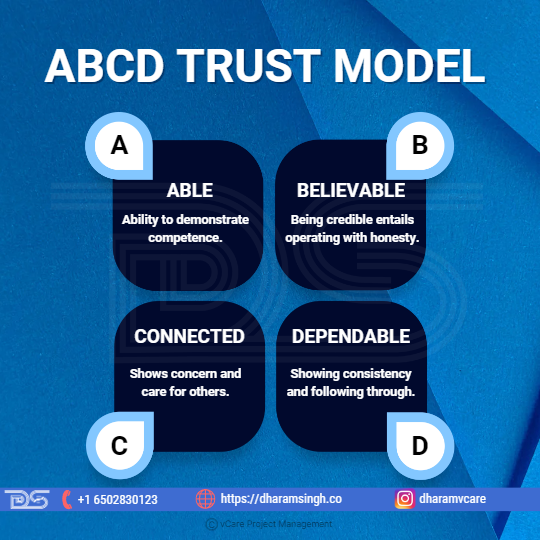
ABCD Trust model
ABCD Trust model
Better relationships will result in better outcomes. That is why developing trusted connections is critical to the success of your organization. When individuals trust one another, they may work efficiently together.
It is well known that low trust harms morale, productivity, and turnover. To prevent these traps, Ken Blanchard created the ABCD Trust Model to help executives understand the activities that affect creating trustworthy relationships.
Blanchard suggests four critical aspects for leaders to develop trust with people: Able, Believable, Connected, and Dependable.
- Able – The term able refers to the ability to demonstrate competence. Leaders demonstrate competence by possessing the necessary skills, education, credentials, and experience. They also exhibit their capacity to lead by accomplishing achievements. Able leaders can encourage people and collaborate with them to achieve goals.
- Believable – Being credible entails operating with honesty. Believable leaders adhere to a set of core beliefs. They know what they stand for and will not compromise their principles under pressure. Being credible also means maintaining promises and not lying or stretching the truth.
- Connected – Connected shows concern and care for others. This aspect fosters trust and contributes to a more engaged workplace atmosphere. Being linked entails attending to people’s needs and promoting their well-being. Leaders also build relationships by giving information not only about the organization but also about themselves. Employees are significantly more likely to provide their best effort when they feel linked to leaders.
- Dependable – Dependable means showing consistency and following through. It entails holding oneself and others accountable for commitments. A trustworthy leader will accept responsibility for their acts and help their followers face adversity.
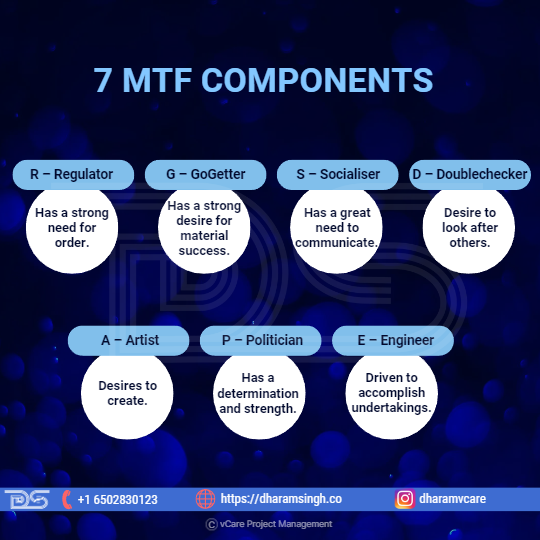
7MTF Components
7MTF Components
The 7MTF model is composed of seven components. We all have all 7 in our personalities; as adults, 2 to 4 will be strong, some will be weak, and others will be ordinary. This mix of elements is one of the most significant variables in deciding our temperament – our emotional predisposition.
- The R – Regulator (formerly known as the Normal) – A person with a ‘strong R’ has a strong need for Order. They will be mature, responsible, calm, and emotionless. You may hear the words ‘should,’ ‘ought,’ and ‘logical’ in their language. They have high expectations of themselves and others, including those with whom they live and work.
- The G – GoGetter (formerly known as the Hustler) – A person with a ‘strong G’ has a strong desire for material success. This individual entails enjoying money and the things it can purchase. The G is quick, opportunistic, intelligent, enterprising, and charming. They are short-term in nature, expecting results immediately or very soon. Promising a G a large monetary reward next year is unlikely to pique their attention.
- The S – Socialiser (formerly known as the Mover) – The ‘strong S’ personality has a great need to communicate. This aspect implies talking about people, fun, events, what you did over the weekend, or anything related to life. Hence, their straightforward, friendly, and frequent grin immediately.
- The D – Doublechecker – The ‘strong D’ is characterized by a desire to look after others and ensure everyone is safe. When you encounter a strong D, expect someone obedient, loyal, and concerned with doing the right thing. One of their greatest assets is their ability to anticipate difficulties and hazards.
- The A – Artist – A person with a ‘strong A’ desires to create. “I want to be different,” is what they would say. These hardworking individuals are conscientious and do not wish to offend anyone. Seek for anything unusual about their attire, such as innovative earrings, cufflinks, a six-button jacket, or an all-black ensemble!
- The P – Politician – A solid handshake and direct eye contact indicate that the ‘strong P’ is determined to win. This person has a determination and strength that others may find challenging. The spoken word is the strong P’s stock in trade – look for status markers like the huge Mercedes in metallic blue.
- The E – Engineer – A person with a ‘strong E’ personality is driven to accomplish undertakings. The strong E has traits such as process, detail, and procedure. This individual can form a strategy and make it happen as soon as they see anything. The E is concerned with completion. So, unless you can assist, you should avoid getting in the way!
Wisdom – strive for mental stability and individual resilience – 10 Competencies
Wikipedia defines wisdom as the “ability to contemplate and act using knowledge, experience, understanding, common sense, and insight.” Psychologists have created a list of ten competencies that are typical therapies in their field and are referred to as wisdom. Self-awareness, self-control, and empathy are the three components of emotional intelligence (EI). Although the fourth component of EI is not formally mentioned among the ten competencies, social influence or influencing others may be considered a result of being highly effective in the other areas.
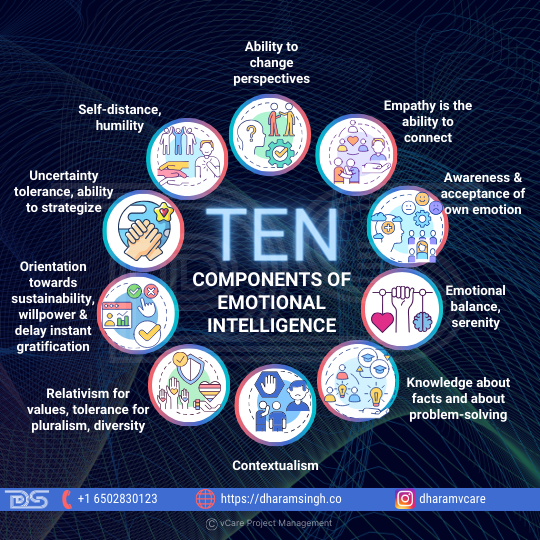
Ten Components of Emotional Intelligence
- Ability to change perspectives – In a bipolar environment, it is possible to remain trapped in one thought and dislike the other viewpoint with strong emotions, which may lead to violence. The ability to look for and identify more points of view implies a shift in viewpoint. Some of the therapies used to treat mental illnesses can help with this. Examples include role-playing, acting, visiting people in various countries, learning about diverse cultures, and brainstorming.
- Empathy is the ability to connect – Understanding people’s intentions, current state of mind, emotions, and mindsets is necessary for being heard, establishing trust, and influencing others. In addition, active listening techniques may help you focus outside yourself and view others as humans who vary from ourselves.
- Awareness & acceptance of own emotions (self-awareness) – Self-awareness leads to increased self-confidence and sincerity. It refers to mindfulness, or being aware of one’s feelings, and is required for self-control and emotional balance.
- Emotional balance, serenity (self-control) – Patience, serenity, and avoiding knee-jerk reactions make you more popular and respected and contribute to mental tranquility. Having a mentor can help you develop and fine-tune this skill.
- Knowledge about facts (know what, assimilation) and about problem-solving (know-how, accommodation) – Wisdom includes knowledge; therefore, it has two components.
- On the one hand, we have factual knowledge about a topic; on the other, we may be specialists in a (typically technical) area. This heuristic knowledge and assimilation are how we apply established systems to circumstances.
- On the other hand, when we encounter new situations or topics, we use accommodation to apply our problem-solving skills. We employ our epistemic intelligence and heuristics to do this.
- Contextualism (consider the situation, timeline, and social relevance) – Even though we have theories and may find similarities in new scenarios, each situation is unique and depends on the circumstances, the context in which the problem develops, and the societal importance. This capacity is achieved via awareness and avoiding picking a solution that works in another context without first examining the present dependencies of the situation.
- Relativism for values, tolerance for pluralism, diversity (which is hard if you are part of the same belief systems for most of your life, like nations and churches) – There are many truths (this is known as non-monism), and yours is only one of them. Others have the right to their realities, which are based on the cultures in which they live, their beliefs and experiences, and the facts to which they have access. Value relativism allows one to accept and appreciate the values of others.
- Orientation towards sustainability, willpower, and delay instant gratification (perspective of linear and circular time flow) – We can pursue long-term goals and make decisions with both short and long-term consequences in mind.
- Uncertainty tolerance, ability to strategize (imaging solutions for scenarios) – Accept that life is unpredictable and swim through it like a river, adapting to currents and waves as they come.
- Self-distance, humility – Do not believe you are the center of the universe, which will remain when you die. Avoid being a taker rather than a giver by avoiding jealousy, bragging, pride, and greed.
Final Thoughts
For today’s project managers, emotional intelligence is a critical concept. Many companies are looking for project managers with strong technical and soft skills. Emotional intelligence is crucial in project management because it enables project managers to improve communication and collaboration in the workplace. It is essential to mention that emotional intelligence can be imparted and nurtured. This aspect implies that as a project manager, one can better oneself by controlling feelings and emotions and developing positive behaviors to influence others at work. One will make better decisions about other people’s emotions, strengths, and weaknesses once they have recognized their thoughts.
Feel free to check out my discussion on this topic with Thomas Walenta in YouTube
For any questions related to your Project Management career, training, and certifications, you can book an obligation free 15 minutes session with me by visiting http://talktodharam.com/
You can subscribe to the vCare Project Management YouTube Channel to catch future videos of our Q&A series and certification success stories: https://bit.ly/2YF0wJl
You can subscribe to and follow my podcasts and interviews with Project Management Experts on YouTube at https://bit.ly/2NDY8wd
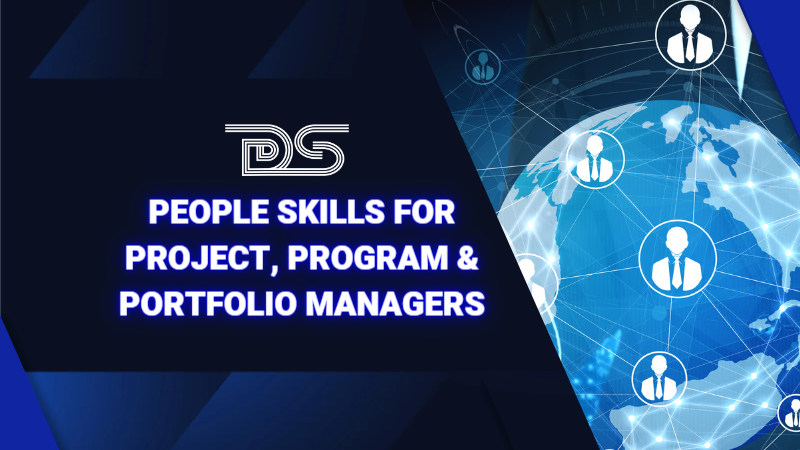
by DharamCW | Apr 21, 2023 | General
What makes a successful Project/Program/Portfolio Manager? Is it the number of years of experience? Technical know-how? Or the one who is good at managing people?
Creating objectives, critical path analysis, work breakdown structures, resource scheduling, and risk management are just a few of the technical areas of project management that project managers usually get training in. However, understanding pertinent people and management issues is important to a project’s success. In addition, a project manager must also continually deal with clients and other stakeholders. As a result, project managers’ people skills, also known as soft skills, are becoming increasingly important.
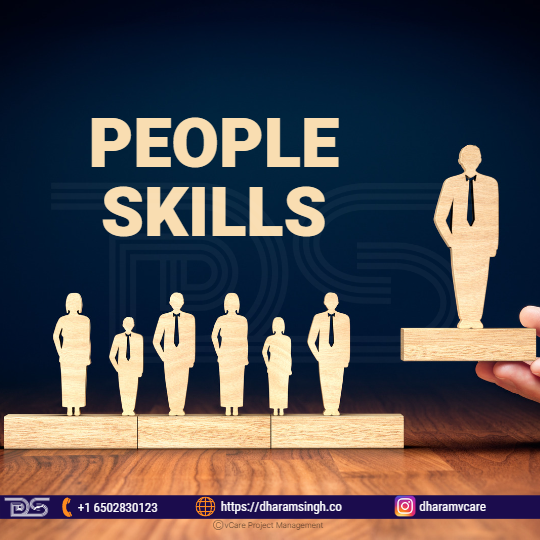
People Skills
People skills
People skills are linked with behavioral patterns or behavioral interactions that assist one in communicating effectively with people. Project leaders with strong people skills may favorably influence others, socialize effortlessly, and overcome public anxiety.
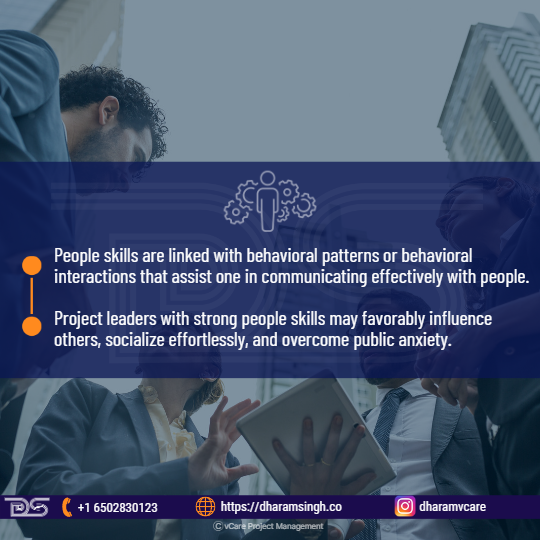
Project Leaders With Strong People Skills
They are transferrable social abilities that allow one to collaborate well with others. The three main types are personal, interaction, and interpersonal skills. These categories achieve the same overall objective: making the working connections with others mutually satisfying, pleasant, and productive.
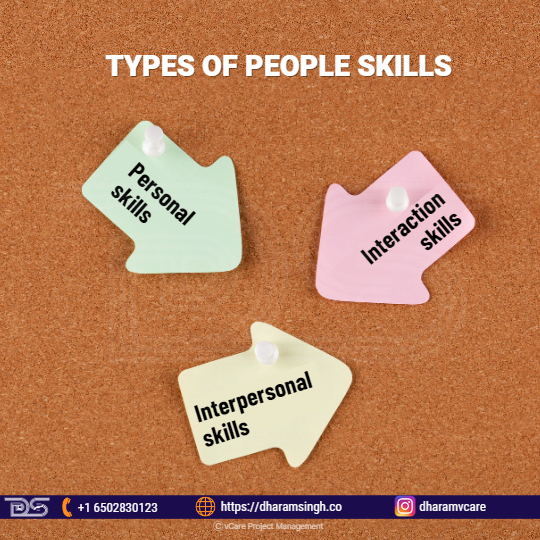
Types Of People Skills
Types of People Skills
- Personal skills: These include the capacity to communicate your skills and exhibit yourself to others successfully. It comprises characteristics such as self-assurance, honesty, and aggressiveness. Furthermore, one must be able to recognize their limitations and make sound judgments based on logic rather than emotion.
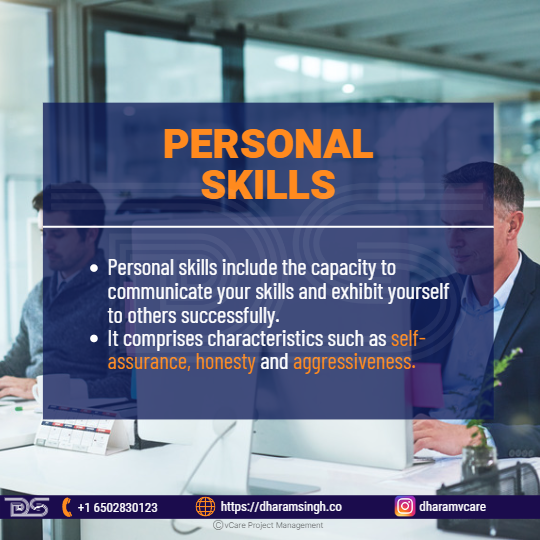
Personal Skills
- Interaction skills: It is essential for understanding the behavior and ideas of others while preserving limits and creating connections. A project manager, for example, should have social etiquettes that need empathy and listening skills to know that you have listened to them and given respect for their limits and requirements to connect with co-workers and clients productively.
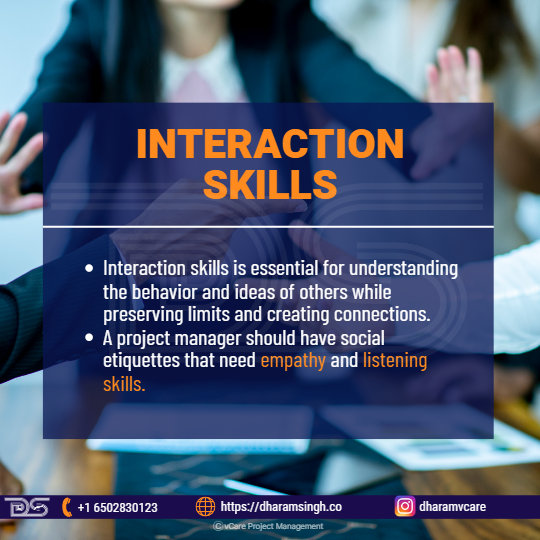
Interaction Skills
- Interpersonal skills: These are related to intercession skills, but they apply mainly to situations in which the persons involved have opposing interests or viewpoints.
Contrary to popular belief, people skills are not subjective concepts. On the contrary, these skills are critical, particularly in the project management role, which is largely concerned with people.
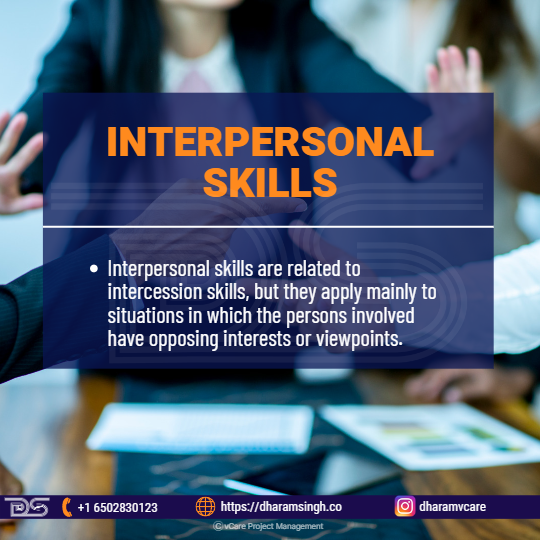
Interpersonal Skills
Project management is more than just completing the project; it is also about how you lead and assist your team. Leading others and leading them through the whole project lifecycle entails a certain amount of responsibility and necessitates certain abilities.
Furthermore, as work evolves, businesses embrace a varied workforce. As a result, people skills are essential for embracing tolerance and diversity. In short, good project management is based on human communication and connection.
Essential People Skills for Project/Program/Portfolio Managers
A successful project professional must possess a wide range of skills. Those that come to mind first are the technical skills required to create a project plan, schedule, budget, and all relevant paperwork. One must also have the conceptual skills to “see” the project as it develops.
However, such talents will only assure project success if the project manager can supplement their technical skills with a wide range of interpersonal skills or people skills. Here are some of the essential people skills for Project/Program/Portfolio Managers:
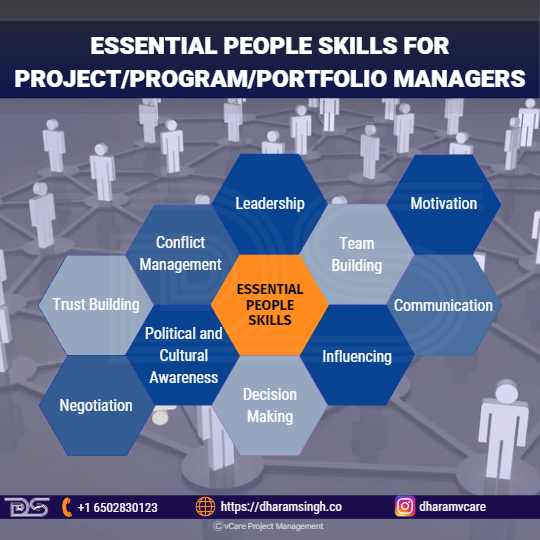
Essential People Skills for Project/Program/Portfolio Managers
- Leadership
One of the crucial skills a successful project manager has to have is leadership. This skill is essential because the project manager frequently has little control over the team members involved. This aspect calls for leadership on their part to handle the project. Although managing via leadership rather than authority might be more challenging, it is typically more effective since it is based on respect and trust.
At the start of a project, a leader must establish their vision and express it to the team. It makes supporting the project’s objectives easier for everyone on the team. Effective leadership will also keep the team members inspired and motivated to perform at their highest level.
- Team Building
Another vital skill for a competent project manager is team building. Because of the nature of projects, personnel from diverse departments are engaged. Most employees might have never worked together and may not even be familiar with one other’s departments. If the project manager can unite these individuals into a cohesive team with the same goal, the project may stay within its objectives.
Although some of the project’s individuals or sub-teams may execute their jobs individually, they must feel like they are part of the overall team. When choosing their part of the project, they must consider what is best for the project, not simply what is best for them and their departmental problem. A sense of belonging to a team that solves an issue for the entire company (rather than playing departmental favoritism) may go a long way.
Creating a team in which each member feels comfortable reaching out to the others will also guarantee that minor problems do not escalate into major concerns later in the project. It is consequently critical that project managers not only understand the duties and procedures involved in team building but also have the skill and finesse to apply them correctly.
- Motivation
If you want your project to succeed, you should concentrate on improving your motivating skills. Having these qualities will assist your project team members to stay interested in the project, strive for excellence, and work toward a common objective.
Good motivating skills will enable a project leader to create an environment where team members can fulfill project objectives while being satisfied with their work.
- Communication
Most professions require excellent communication skills. Some project managers believe the communication part of project management to be their primary job obligation.
Excellent communication skills are essential for building relationships among project team members, establishing trust, and keeping everyone motivated and on track.
A project involves several stakeholders informed of its status, timeframes, progress, risks, and concerns. A skilled project leader must convey all of these facts to project stakeholders on time and in the manner they anticipate. Project managers must also interact effectively with top management within their business.
Giving the interested stakeholders too much or not enough information might prevent the project from reaching its full potential.
- Influencing
It is critical to be able to influence people if you want to be a successful project manager. But what is important is understanding when and how to utilize such skills and avoid becoming a manipulator. There is a narrow path to follow.
A project manager’s responsibility is to bring employees from disparate departments together and get them to work together toward a similar objective. Sometimes, getting these diverse people to comprehend and agree on the specifics of achieving that goal might not be easy. A skilled project leader will utilize their skills to persuade others and assist them in reaching an agreement.
So, think about your relationship and influence over people not just for the time of the project but also for how things will proceed long after the project is complete. After the project, customers and end-users will utilize the goods, deliverables, and outcomes developed by the project. A powerful and positive effect creates a trusting atmosphere among all team members during and even after the project.
- Decision Making
A successful project manager must acquire various talents, one of which is decision-making skills. There are four primary decision-making styles: Directive, Analytical, Conceptual, and Behavioral. Project managers should be conversant with all four since either has to be leveraged at some time. In addition, consultation, consensus, command, and random styles are provided.
Having a decision-making model will facilitate this process. In addition, since so many people who may disagree with a decision are involved in the project, having a process to follow can be very helpful in gaining consensus with the group.
- Political and Cultural Awareness
In today’s world, project managers work in a more globalized context than in the past. As a result, cultural diversity is another critical component of effectively navigating the corporate world as a project leader. A successful project manager must be able to notice and comprehend cultural differences and incorporate them into the project plan.
Cultural differences can impact decision-making and the pace with which work is performed. It can also lead to members acting without sufficient forethought. Recognizing cultural differences can lead to conflict and stress within the project, further delaying it.
Furthermore, it is critical to understand the politics at work in the project environment. The use of political skills can greatly aid a project manager’s success. More significantly, failing to recognize the politics involved can lead to substantial challenges and impediments that can cause a project to be delayed or even destroyed.
- Negotiation
The nature of a project manager’s work necessitates being skilled negotiators. Typically, several stakeholders are involved in the project, and most projects include team members from many departments. This aspect frequently leads to a variety of points of view, which can make it challenging to keep the project on track and within the intended scope.
Negotiation skills can assist a project manager in obtaining an agreement or making a compromise on an issue that may be causing difficulty or delay.
There are several negotiation skills that the project leader should be able to employ. These include assessing each scenario, being an engaged listener, and communicating coherently throughout the dialogue. It can be important to distinguish between the wants and requirements of the people concerned. Another critical focus is recognizing the distinction between people’s perspectives and their interests and concerns directly relevant to the project.
- Trust Building
When collaborating on a project, trust is really valuable. A trusting environment promotes effective relationships and communication among team members and stakeholders. Therefore, a project leader wants to foster an atmosphere of mutual trust. This trust helps to maintain morale, keep conflict at a minimum, and keep everyone working effectively together.
If you were working on a project, you would want everyone participating and working hard to see it through to completion. When you work hard, you expect that others are also working hard to achieve the project objectives. The team leader wants to trust a team member who suggests they can execute a task properly and on time. If someone in the team wants assistance, they want a team that will support and collaborate to achieve the work. So don’t waste time second-guessing someone who isn’t telling the truth or has bad motives.
There are several approaches for a project manager to establish trust. First, a project leader must be a great and open communicator to reduce misunderstandings and build confidence among team members. Often, one may have to put their self-interests aside for the team’s sake and must model and display the behavior they demand from others.
- Conflict Management
On a project, conflict is almost unavoidable. Members of the project team and stakeholders may have differing perspectives, areas of expertise, interests, personalities, work styles, and so on. When one adds additional factors to the mix, such as tight deadlines, resource limits, and communication challenges, it’s easy to understand how conflict might arise.
Conflict often leads to a better solution to a problem. For example, if a team member would prefer to agree or accept the status quo, then risk causing conflict by pointing out a problem, asking a question, or suggesting an improvement. In that case, it is simpler to accept a suboptimal solution. However, disagreement frequently stops the team from working successfully together and diverts attention away from the duties at hand.
The goal is to prevent conflict or its escalation or to know how to regulate or lessen it when it arises if they cannot avoid it. For example, a project manager may use several tactics or methods when dealing with a dispute. They can be aggressive, accommodating, avoiding, or compromising. Some approaches work better in particular situations than others.
The project manager and team members involved in the conflict influence the team’s efficacy. A project manager can also utilize many approaches; if one fails, they may have to try another to see if it is more successful.
Why are people skills important?
People skills are crucial because it is much more difficult for people in an organization to work together to achieve common goals if they fail to express themselves or understand how their co-workers feel about a certain project, task, or difficulty.
As a result, the organization’s production and profitability suffer while creativity and innovation endure. People skills, in particular, may assist us in the following:
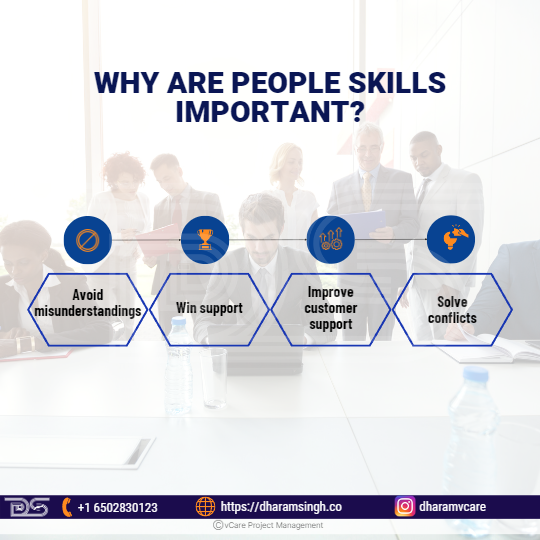
Why Are People Skills Important?
- Avoid misunderstandings: People are less likely to misinterpret what you’re saying if you communicate ideas and instructions.
- Win support: If you can communicate effectively and understand what your team wants to hear, it will be much simpler to persuade them and get them “on board.”
- Improve customer support: You’ll be better positioned to fix their difficulties if you can get inside their minds and comprehend their key problems.
- Solve conflicts: Conflict isn’t always unpleasant, but if it goes unresolved, it can harm morale and productivity. Strong people skills allow us to see things from a new perspective and identify similarities, which reduces the likelihood of significant conflicts.
How to develop people skills?
Even while people skills are critical, they are frequently undervalued by employers when it comes to job advancement. Internal training sessions are frequently centered on teaching hard skills, such as completing a given activity or utilizing a specific piece of software. These methods make it more difficult for professionals to build their interpersonal skills.
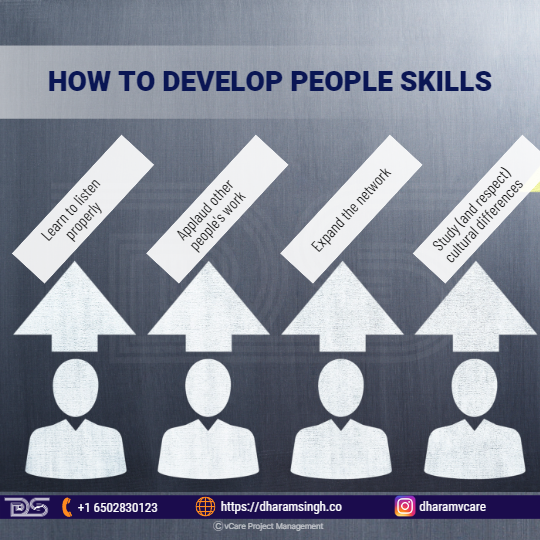
How To Develop People Skills?
But just because something is more difficult does not make it impossible. Here are four suggestions for improving people skills and becoming a more attractive prospect are:
- Learn to listen properly
- Applaud other people’s work
- Expand the network
- Study (and respect) cultural differences
Final Thoughts
Effective project management is challenging but having people skills may help project leaders run projects more efficiently and with less stress. Furthermore, it enables building a team that can handle the most challenging tasks and is more successful and resilient during difficult times.
People skills, on their own, will not keep a project team motivated and engaged. However, arming oneself with the necessary technical skills and intelligent tools may dramatically enhance the workflow and contribute to the project’s success.
Feel free to check out my discussion on this topic with Thomas Walenta in YouTube
For any questions related to your Project Management career, training, and certifications, you can book an obligation free 15 minutes session with me by visiting http://talktodharam.com/
You can subscribe to the vCare Project Management YouTube Channel to catch future videos of our Q&A series and certification success stories: https://bit.ly/2YF0wJl
You can subscribe to and follow my podcasts and interviews with Project Management Experts on YouTube at https://bit.ly/2NDY8wd









































Recent Comments